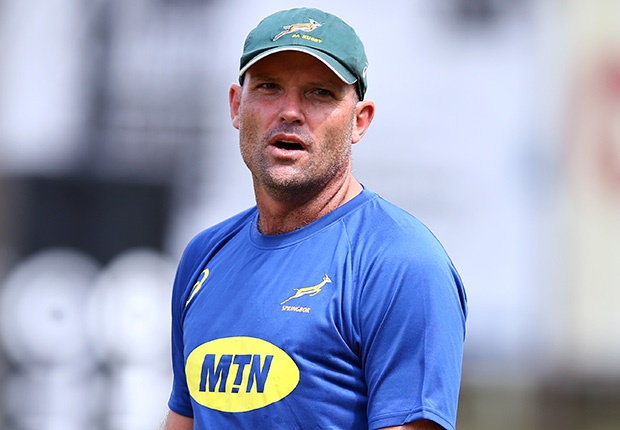


Jacques Nienaber (Gallo Images)
- Six likely Tests in a row on New Zealand soil is as tough as it gets for a starting-out Springbok head coach.
- Jacques Nienaber admits it will be a “massive challenge” to retain the Rugby Championship crown.
- The Boks may need to beat the All Blacks in each of the two meetings… and successive victories there are rare for them.
Will a Springbok head coach ever have had a harsher baptism in the role?
That is something to contemplate following the revelation this week that World Rugby has approved a 7 November to 12 December window for the Rugby Championship to be held in a single country – highly likely to be the currently coronavirus-free New Zealand.
When he was confirmed as World Cup 2019-winning Rassie Erasmus’s successor in the role in late January, Jacques Nienaber would already have been envisaging a more traditional mid-year Bok kick-off, with useful home Tests against strictly moderate powers Scotland (two) and an additional one against first-time visitors to these shores Georgia.
They are ranked ninth and 12th respectively on the planet.
Instead, the pandemic would soon enough be wreaking havoc with both Super Rugby-proper, suspended in March and never resurfacing in fullest mode, and that trio of scuppered Bok assignments.
Now Nienaber looks highly likely to begin his much-delayed tenure in about as taxing a climate as you can think of: a full six weeks of fixtures (two each) against major southern hemisphere rivals New Zealand, Australia and Argentina.
What’s more, it seems destined to entirely be on the soil of an All Black team desperate to return to the top of the pile after the Boks stripped them of the Webb Ellis Cup for the first time since 2011 late last year in Japan.
Although this may apply to all the sides in the annual tournament, an early November start to the Championship will mean the world champions have not played as a unit since the RWC final against England on 2 November… a few days more than a year previously, by then.
Only making the task tougher is the likelihood, unless there is a sudden new Covid-19 spike in the Land of the Long White Cloud, that spectators will be present: a serious fillip for Sam Cane and company particularly when they tackle traditionally premier rivals the Boks.
Huge head-start
Just another glaring advantage – though rugby fans in all the competing countries will be delighted to simply see their favourites in action again – for New Zealand will be the huge head-start their players have enjoyed in a return to competitive play through the ongoing, enthralling Super Rugby Aotearoa.
South Africa’s return to either a Currie Cup or “mini-Super Rugby” of their own remains several weeks away and still shrouded in some doubt.
The whole situation begs a further question: would the Boks winning (and thus retaining) the Rugby Championship wholly on NZ turf be a tougher task than even winning the last World Cup was?
Some might wish to instantly pooh-pooh that idea, just on the grounds of RWC being the loftiest, most coveted stage of them all for global importance.
But think a little more deeply, after comparing rosters.
The Springboks’ route to a third World Cup success in Japan came in this sequence: New Zealand, Namibia, Italy, Canada (all pool phase), Japan (quarter-final), Wales (semi-final) and England (final).
That presented a generous period, after the group-opening defeat to the All Blacks, where the Boks played several teams in a row they would always be hugely tipped to beat.
Of all those games, only one couldn’t be termed neutrally staged: the Tokyo Stadium last-eight tussle against the host nation, which they won comfortably enough 26-3.
With respect, there will be no “Canada” or “Namibia” (the sort of occasions where squad rotation/experimentation in selection is customary by the heavy favourites) when the Boks tackle the Championship… and two of those matches will effectively be away to the All Blacks with their fervent support base.
‘It’s a daunting task’
There is every chance, considering New Zealand’s home advantage throughout the tournament, that the Boks may need to find it within them to knock over the All Blacks in each of their two meetings to have best chance of retaining the crown.
That would simultaneously mean posting back-to-back victories against NZ away for just a third time in history.
The first occasion was on the iconic Australasian tour by Philip Nel’s “Invincibles” in 1937, when they came from 1-0 down in Wellington to beat the All Blacks 13-6 in Christchurch and 17-6 in Auckland.
It has only happened once in the professional era, albeit split between two years: the Boks won a 2008 Tri-Nations match in Dunedin 30-28 (famous for Ricky Januarie’s decisive try) and then clinched the 2009 Tri-Nations title with a heart-stopping 32-29 triumph in Hamilton under John Smit’s captaincy.
“You may be right… it is a daunting task,” Nienaber said in a chat with Sport24 on Thursday when asked about whether the Championship might be more difficult than RWC 2019.
“For a World Cup (trophy triumph) it is about peaking at the right time after a four-year lead-up; the Championship has a different feel and this will be a massive challenge if it is held entirely in New Zealand.”
*Follow our chief writer on Twitter: @RobHouwing

